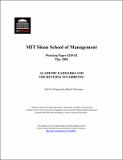| dc.description.abstract | Despite a large literature on lobbying and information transmission by interest groups,
no prior study has measured returns to lobbying. In this paper, we statistically estimate
the returns to lobbying by universities for educational earmarks (which now represent
10 percent of federal funding of university research). The returns to lobbying
approximate zero for universities not represented by a member of the Senate
Appropriations Committee (SAC) or House Appropriations Committee (HAC).
However, the average lobbying university with representation on the SAC receives an
average return to one dollar of lobbying of $11-$17; lobbying universities with
representation on the HAC obtain $20-$36 for each dollar spent. Moreover, we
cannot reject the hypothesis that lobbying universities with SAC or HAC
representation set the marginal benefit of lobbying equal to its marginal cost, although
the large majority of universities with representation on the HAC and SAC do not
lobby, and thus do not take advantage of their representation in Congress. On
average, 45 percent of universities are predicted to choose the optimal level of
lobbying. In addition to addressing questions about the federal funding of university
research, we also discuss the impact of our results for the structure of government. | en |
